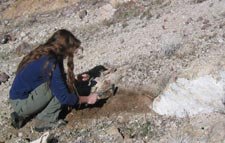Opal Mountain 

 In
early February we set off for a day trip to the Opal Mountain
area. Opal Mountain, just north of the Black Mountain
Wilderness, has a lot to offer. Its name seems to hint
at the possibility of finding some opal. You will find
it, but most will be common opal which, although it comes in
many colors of honey, green, orange, red, yellow and white,
lacks the fire of the better known precious opal. In
the 1900's, mines in the Scout's Cove area produced precious
opal, as well as some beautiful cherry and orange common opal. However,
the best seams were about 200 feet below the surface and were
locked in extremely hard rock. Ultimately the expense
of extracting the opal became too much and the mine closed
down. Recently the BLM bulldozed all vestiges of the
mine itself. The good news is that the area is crawling
with common opal. In many cases you can simply pick up
chips from earlier rockhounds. The best specimens, though,
are gotten by extracting them from the seams with chisels and
hammers.
In
early February we set off for a day trip to the Opal Mountain
area. Opal Mountain, just north of the Black Mountain
Wilderness, has a lot to offer. Its name seems to hint
at the possibility of finding some opal. You will find
it, but most will be common opal which, although it comes in
many colors of honey, green, orange, red, yellow and white,
lacks the fire of the better known precious opal. In
the 1900's, mines in the Scout's Cove area produced precious
opal, as well as some beautiful cherry and orange common opal. However,
the best seams were about 200 feet below the surface and were
locked in extremely hard rock. Ultimately the expense
of extracting the opal became too much and the mine closed
down. Recently the BLM bulldozed all vestiges of the
mine itself. The good news is that the area is crawling
with common opal. In many cases you can simply pick up
chips from earlier rockhounds. The best specimens, though,
are gotten by extracting them from the seams with chisels and
hammers.To
get to this area you must first get to the small town of Hinkley,
about 15 miles west of Barstow on Highway 58. From there
drive north on Hinkley road until you come to CO99. The
BLM map for Cuddeback
Lake has all the route numbers. Also,
James Mitchell's Gem Trails of Southern California has
a map and directions on pages 112-113 of the expanded and revised
edition. Continue northeast on CO99 until you come to
C297, Opal Mountain Road, which branches off to the northwest. The
turnoff is just  past the Coolgardie Road on your right. When
we were there the roads were in good condition. However,
as is typical with all desert roads, conditions can change
drastically. We're always happy to have a four wheel
drive vehicle even though it isn't always necessary.
past the Coolgardie Road on your right. When
we were there the roads were in good condition. However,
as is typical with all desert roads, conditions can change
drastically. We're always happy to have a four wheel
drive vehicle even though it isn't always necessary.
 past the Coolgardie Road on your right. When
we were there the roads were in good condition. However,
as is typical with all desert roads, conditions can change
drastically. We're always happy to have a four wheel
drive vehicle even though it isn't always necessary.
past the Coolgardie Road on your right. When
we were there the roads were in good condition. However,
as is typical with all desert roads, conditions can change
drastically. We're always happy to have a four wheel
drive vehicle even though it isn't always necessary.Our
explorations in the Opal Mountain area were completely unplanned. If
we saw a canyon that looked interesting we'd stop and hike.
This brought us to an area that was littered with jasper of
all colors. Another stop at the top of a drop-off into
a deep canyon showed evidence of Indian use in the form of
a mortero. Niki also uncovered a seam of light green
colored opal that was quite nice. She spent a couple
of hours extracting some really nice specimens. I hiked
down into the canyon itself to find a frozen pond and seams
of white opal. The oddity of the hike was a small rocket,
probably some type of flare, that had U.S. Army stenciled on
its side. We also visited a mine area and a spring. Winter
days are short, and as always we hated to leave because there
was so much more to see. However, that frozen pond
in the canyon reminded us that a long, cold night in the tent
didn't sound that appealing. As the sun set we had gotten
back to Barstow and onto Highway 15 for the trip back
to San Juan Capistrano and a cozy evening.
